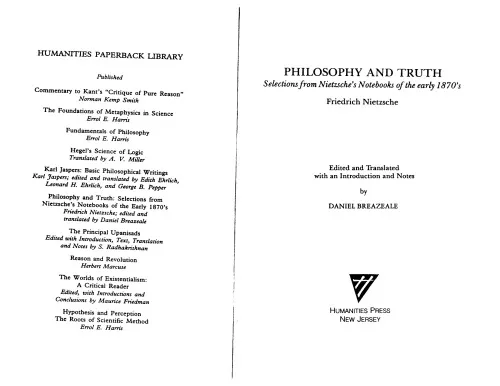On Truth and Lies in a Nonmoral Sense
4.8
Reviews from our users

You Can Ask your questions from this book's AI after Login
Each download or ask from book AI costs 2 points. To earn more free points, please visit the Points Guide Page and complete some valuable actions.Related Refrences:
Introduction to "On Truth and Lies in a Nonmoral Sense"
Written by the profound German philosopher Friedrich Nietzsche, "On Truth and Lies in a Nonmoral Sense" is a revolutionary essay that explores the nature of truth, language, and human understanding. This seminal work, composed in 1873, delves into humanity's tendency to construct conceptual systems and language as a means of imposing order on the chaos of existence. Nietzsche challenges conventional notions of truth, proposing that truth itself is a human invention—a "mobile army of metaphors"—rather than an objective or permanent reality.
The essay is concise yet dense, packed with thought-provoking assertions that have left its readers contemplating the way humans perceive and process the world. Though relatively lesser-known compared to Nietzsche's other works, such as "Thus Spoke Zarathustra" or "Beyond Good and Evil," this essay forms a foundational pillar of his critique of traditional metaphysics, morality, and the human reliance on language to understand reality.
Detailed Summary of the Book
Nietzsche begins by questioning the role and value of truth in human life, asserting that our pursuit of truth is driven more by practical needs than a genuine desire to comprehend an ultimate reality. He argues that human beings are not inherently truth-seekers but are more frequently concerned with survival and the avoidance of discomfort. In this context, truth becomes a convenient fiction—a construct created to provide stability and coherence to our lives.
The essay critiques the reliability of language, suggesting that words and concepts are abstractions that fail to capture the essence of the world as it is. Nietzsche uses powerful imagery to describe how human beings construct meaning through metaphors, which are layered upon one another to form cultural and linguistic systems, far removed from the actual state of the world. He calls attention to the inherent deception in these systems, claiming that our understanding is built upon a foundation of misinterpretation and simplification.
One of the key illustrations Nietzsche provides is humanity's habit of comparing objects, assigning names to them, and forming generalizations. This, he argues, strips the individuality and uniqueness of phenomena, reducing them to human-imposed categories. In effect, Nietzsche contends that "truths" are not eternal or unchangeable but are instead social agreements that reflect human needs and biases rather than any objective reality.
Key Takeaways
- Truth is not a transcendental or immutable concept but a product of human language and social conventions.
- Language is inherently metaphorical and presents a distorted version of reality rather than an objective account of it.
- Human beings create systems of meaning to navigate existence, but these systems are rooted in subjective interpretation rather than absolute truth.
- Naming and categorization simplify a complex and chaotic reality, giving rise to a false sense of order and understanding.
- The pursuit of truth, often seen as noble, is instead driven by pragmatic concerns and a desire to impose coherence on an otherwise indifferent universe.
Famous Quotes from the Book
"What then is truth? A mobile army of metaphors, metonyms, and anthropomorphisms—in short, a sum of human relations which have been poetically and rhetorically intensified, transferred, and embellished, and which, after long use, seem solid, canonical, and binding to a people."
"We believe that we know something about the things themselves when we speak of trees, colors, snow, and flowers; and yet we possess nothing but metaphors for things—metaphors which correspond in no way to the original entities."
"The drive toward the formation of metaphors is the fundamental human drive, which one cannot for a single instant dispense with in thought."
Why This Book Matters
"On Truth and Lies in a Nonmoral Sense" continues to resonate deeply in contemporary discussions about postmodernism, epistemology, and the philosophy of language. By deconstructing the concept of truth, Nietzsche invites readers to question the foundational principles upon which they base their understanding of the world. This essay is a call to intellectual humility, urging us to recognize that what we often take for granted as “truth” is merely a reflection of our shared metaphors and human perspectives.
Moreover, the essay's examination of language as a tool of human interpretation has influenced a broad range of disciplines, from literary theory and linguistics to cognitive science and existential philosophy. Nietzsche compels us to face the uncomfortable realization that much of what we hold to be certain is, at its core, subjective and mutable. For anyone grappling with questions about the nature of reality, perception, and human meaning-making, this essay is an indispensable starting point.
Free Direct Download
You Can Download this book after Login
Accessing books through legal platforms and public libraries not only supports the rights of authors and publishers but also contributes to the sustainability of reading culture. Before downloading, please take a moment to consider these options.
Find this book on other platforms:
WorldCat helps you find books in libraries worldwide.
See ratings, reviews, and discussions on Goodreads.
Find and buy rare or used books on AbeBooks.
1121
بازدید4.8
امتیاز0
نظر98%
رضایتReviews:
4.8
Based on 0 users review
Questions & Answers
Ask questions about this book or help others by answering
No questions yet. Be the first to ask!





![The Ultimate iOS Interview Playbook: Conquer Swift, frameworks, design patterns, and app architecture [Team-IRA]](https://s3.refhub.ir/images/thumb/The_Ultimate_iOS_Interview_Playbook__Conquer__29925.webp)







